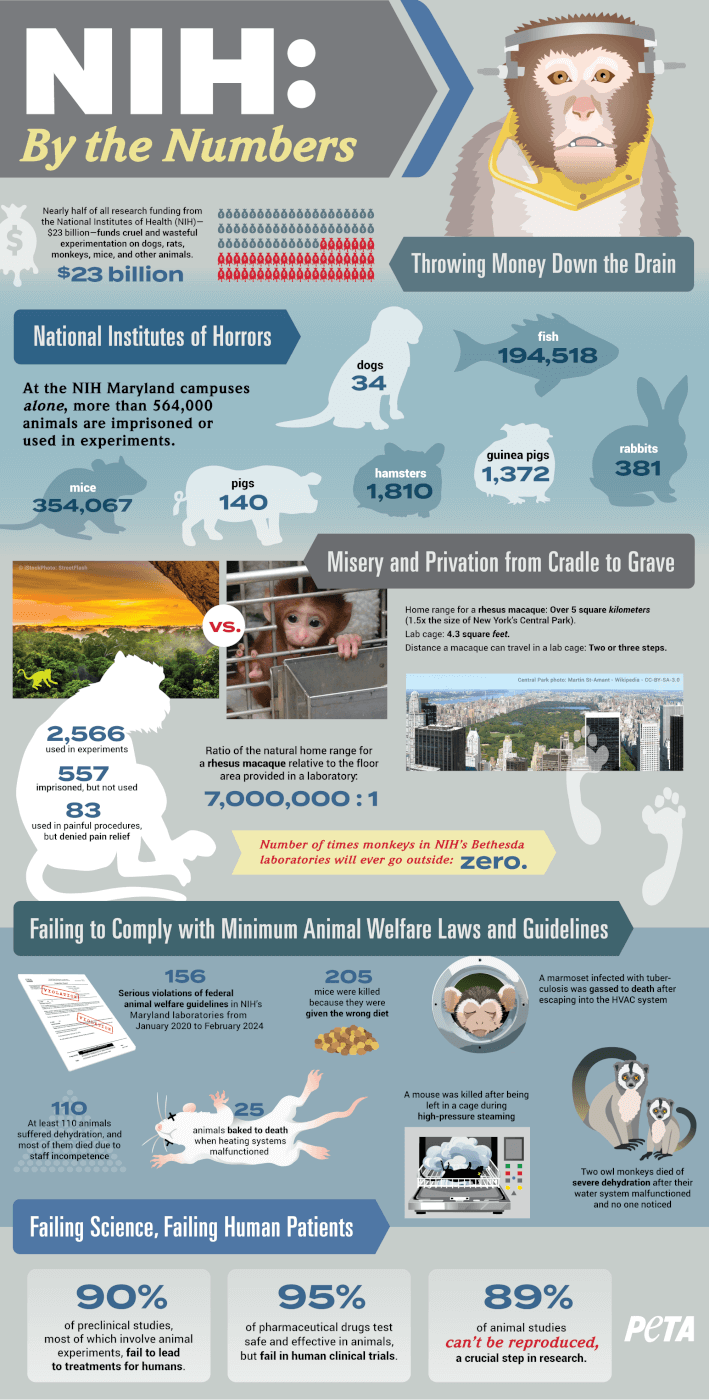NIH Squanders Billions, Wastes Animals’ Lives, and Helps Very Few

Update (May 1, 2025): After decades of pressure from PETA and other advocates, NIH has announced that the agency will prioritize state-of-the-art, non-animal research and reduce experiments on animals. This is a win for animals, human patients, and taxpayers. By embracing key recommendations from PETA’s Research Modernization NOW, including increasing funding, training, and infrastructure for non-animal methods, NIH is taking a bold step toward more effective, ethical science. PETA looks forward to supporting this transformative shift and ensuring it results in real, lasting change for both humans and other animals.
The National Institutes of Health (NIH), the foremost medical research authority in the U.S., has the lofty and admirable goal of seeking scientific knowledge that will “enhance health, lengthen life, and reduce illness and disability.” The reality is starkly different. The agency squanders tens of billions of taxpayer dollars on painful and deadly experiments on animals that do nothing to advance our understanding of human health.
NIH imprisons hundreds of thousands of animals in its own government laboratories while also funding numerous animal laboratories at universities across the country, all at taxpayers’ expense. In fact, nearly half of NIH’s bloated budget funds animal experiments—about $23 billion annually.


Again, for Those in the Back: Animal Experiments Don’t Work
Ninety percent of basic research—most of which involves animals—fails to lead to treatments for humans. A whopping 95% of pharmaceutical drugs that test safe and effective in animals are unsuccessful in human clinical trials. And in its strategic plan for 2016 through 2020, NIH actually acknowledged that “animal models often fail to provide good ways to mimic disease or predict how drugs will work in humans.”
It’s not as though these data are hidden. NIH knows that animal experiments rarely translate to human treatments, yet it continues to squander billions on this cruel and pointless enterprise—lining experimenters’ pockets while also betraying both its mission and the public trust.

NIH Can’t Even Keep Its Own House in Order
Government documents, obtained by PETA, show that NIH routinely has failed to comply with minimal animal welfare regulations and guidelines in its laboratories—where vulnerable animals have endured almost unimaginable pain and misery.
Animals suffocated, starved, and died of dehydration. They became entrapped in parts of equipment and died while frantically struggling to escape. Experimenters who used dogs in a septic shock study deviated from the approved protocol, including by using sutures that caused infection. Four monkeys became terribly dehydrated when inattentive staff failed to notice a disconnected water line. A female owl monkey died in her cage after losing 20% of her bodyweight and becoming severely anemic.

Forging a New Path
It’s time to radically transform the modus operandi of NIH and redirect taxpayer money from failing animal experimentation to modern, human-relevant methodology, where it can actually do some good.
Research Modernization NOW, developed by PETA scientists, provides a strategy for phasing out these studies.
Take action to encourage your legislators to embrace technology and cutting-edge science—such as organs-on-a-chip, three-dimensional tissue models, and supercomputers—that will save millions of lives.
